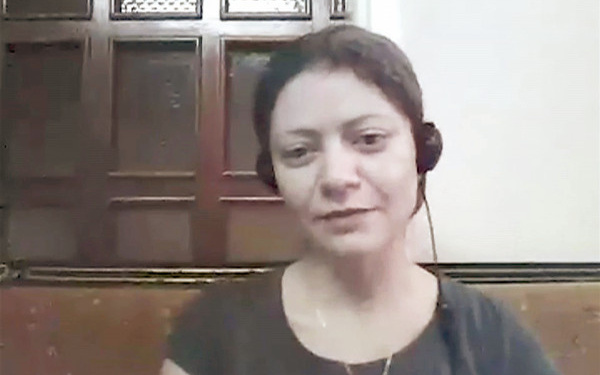Razan Zaitouneh (pictured) was one of the most prominent human rights activists in Syria’s conflict.
An attorney defending political prisoners since 2001 and co-founder of a series of human rights organizations, she went into hiding after being accused by the Assad regime of being a foreign agent, days after the start of the Syrian uprising in March 2011.
Through the Local Coordination Committees of Syria and the Violations Documentation Center, Zaitouneh documented human rights abuses as one of the most reliable sources about the conflict.
Then on December 9, 2013, Zaitouneh, her husband Wael Hamada, and VDC colleagues Samira Khalil and Nazem Hammadi disappeared from Douma, a town near Damascus.
See also Syria Spotlight: The Kidnapping of Razan Zaitouneh
Syria: Zaitouneh’s Last Video Before Abduction “Hope Amid Slow Death of Siege”
For more than 7 1/2 years, Zaitouneh’s fate has not been confirmed, nor the identity of her abductors. Some activists suspected the anti-Assad faction Jaish al-Islam, in control of Douma. Jaish al-Islam denied responsibility and blamed the Assad regime.
Now Germany’s Deutsche Welle, drawing on evidence across six countries, presents a case that Jaish al-Islam threatened and then kidnapped the Douma Four.
The Threats
Friends — such as Nadim Houry, director of the Arab Reform Initiative — say Zaitouneh was insistent that human rights abuses by all groups be recognized and documented.
That unsettled Jaish al-Islam, which had smuggled Zaitouneh and her husband Hamada out of Damascus.
Mohammed Alloush, the former leader of Jaish al-Islam, tells DW:
I myself advised Mrs. Razan that writing about the regime is a great ethical matter.
But, before writing reports about violations committed by opposition groups, I asked her to talk to them, give them advice and teach them about human rights.
Other rebel and activist sources say Jaish al-Islam members tried to discredit Zaitouneh on social media. When she persisted, she received a threatening letter and shots were fired at her door.
Hussein al-Shazly, a local security figure, later confessed to receiving direct orders from Jaish al-Islam’s religious leader Samir Kaakeh to carry out the threats according to rebel sources and a former Jaish al-Islam member.
Shakly said on an audio recording:
The Disappearance
Deutsche Welle found few clues over the disappearance and fate of the Douma Four. However, one of them points to Jaish al-Islam’s responsibility.
In February 2014, a Jaish al-Islam member connected to his social media accounts via a computer given to Zaitouneh and Khalil by a US State Department-funded program.
A DW source says he alerted US Ambassador Robert Ford, and American authorities geolocated the computer, tracing it to Jaish al-Islam’s security complex in Douma.
Jaish al-Islam’s founder, Zahran Alloush, was confronted with the information. He denied any involvement in the abduction, and 24 hours later, the social media accounts of the member who used the computer were deleted.
Months later, a woman detainee saw Zaitouneh at Jaish al-Islam’s Tawbeh Prison:
They once brought her to an interrogation. She refused, so they beat her, and she fainted. They asked us to bring her back into her cell. When she woke up, I saw her green eyes.
Other DW sources said several witnesses identified Zaitouneh in Tawbeh Prison between 2014 and 2017.
No Release, No Resolution
Jaish al-Islam spokesman Hamza Bayraqdar responded to DW, “I officially deny, and we have previously denied, that Jaish al-Islam has held anyone from Razan’s team, neither Razan nor her companions. Absolutely, never, definitively — and I swear to that.”
DW assesses that Zahran Alloush, who was assassinated by the regime on December 25, 2015, was unaware of the kidnapping of the Douma Four in advance. The site pins responsibility on Alloush’s deputy Abu Qusai al-Dirani, who oversaw Jaish al-Islam’s security branch, and its religious leader Kaakeh.
DW’s requests for interviews with both men were denied.
Mazen Darwish, a human rights lawyer and friend of Zaitouneh’s, says negotiations for the release of the Douma Four were scuttled by Alloush’s assassination.
Successor Mohammad Aloush (no relation), who now owns a restaurant in Istanbul, reportedly did not pursue the talks. DW says Qatar, at the request of the US, offered $5 million for the four activists, but had no success.
More than 7 1/2 years later, what remains are the words of Zaitouneh, through the ongoing work of Syrian activists, her videos, and her friends. As Tamara Alrifai wrote, days after the Douma Four were abducted:
I can almost hear Razan say, in her soft shy voice: “Such an act will not stop other Syrians from documenting what they witness, nor will it muzzle human rights defenders.”

